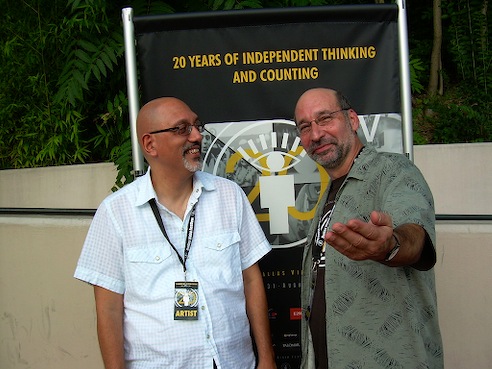Supporting player: Dallas Morning News downsizing no longer the prime focus of Stop the Presses doc
08/06/07 11:40 AM

By ED BARK
Filmmaker Mark Birnbaum initially felt inclined to tell a smaller story about large-scale downsizing at The Dallas Morning News.
Now, for better or possibly worse, Stop the Presses: The American Newspaper In Peril tentatively will paint just a splotch of Dallas on a much larger canvas. Birnbaum and former DMN entertainment writer Manny Mendoza instead have ranged far and wide to amass, by their count, 103 interviews and 108 hours of film.
That's very close to the 112 DMN staffers, including this writer, who took the buyout last September. Might it also make for an unmanageable documentary slated to run at exactly 56 minutes, 46 seconds if it ends up as hoped for next year on public television's POV series?
"It's a challenge. They're all challenges," Birnbaum said Sunday night before Stop the Presses had its first public showing in the form of a 15-minute sampler at the Dallas Video Festival. "This one is pretty interview-heavy. The challenge is going to be also finding a compelling visual way to tell the story."
Birnbaum and Mendoza began filming immediately after the Sept. 15 exodus from the DMN, which less than two years earlier had laid off more than 60 staffers. Most of those interviews were either with ex-DMNers or interested observers living in the newspaper's circulation area. But that was then.
"It's not the core of the film, no," Birnbaum said. "When you guys were going through the buyout, I was drawn to you as people I know going through something very challenging and personal. That's what drew me emotionally toward the subject. We had thought at one point that the stories of what people were going through at least might be the emotional core of the film. I'm not even sure if that's going to happen."
"Definitely the story has expanded since we first started shooting in Dallas," Mendoza said.
They've landed some big names -- Walter Cronkite, Ben Bradlee, Ken Auletta -- and a large number of lesser known newspaper editors and analysts. But so did Lowell Bergman in his recent four-part News Wars series for PBS.
Last February's Part 3 of Bergman's series telescoped the tumult at The Los Angeles Times to tell a larger story about the possibly dismal future of newspapers in the face of the Internet and stockholder demands on publicly traded companies. Belo Corp., which owns the DMN, is one of those companies. Its executives so far have declined to be interviewed for Stop the Presses.
"But it's gonna happen," Mendoza insisted.
"I don't think that's the way they do things," Birnbaum disagreed. "I don't think they're going to cooperate."
"We've got so many great people," Mendoza said. "If we get nobody else, it's still gonna be great."
They hope to have a rough cut of the film finished by early fall. Sunday's excerpt began at a Sept. 10 party where many DMN staffers gathered to imbibe and commiserate before the mass walkout.
The always outspoken and voluble Jeffrey Weiss, who remains at the paper, says on camera that losing more than 100 people clearly would diminish the DMN. It wouldn't matter who left, he said. The sheer volume of departures would make the paper "less good as a result."
Former DMN reporter Michael Precker, now a day manager at The Lodge gentleman's club, says matter-of-factly, "The worse you make the product, the faster it's going to decline."
The segment then mostly went national, showcasing a dozen or so out-of-state talking heads. Much of what they say already has the feeling of same-old, same-old. Just read Romenesko.com on any given day.
During a brief Q&A session after the screening, Precker wondered whether Stop the Presses would find its way back toward the "personal" stories of some who left the paper. He didn't get a direct answer, but was chided by Video Festival founder Bart Weiss. Did Precker want even more screen time, Weiss asked.
That wasn't the intent of Precker's question, which raised a valid point. Stop the Presses, bankrolled in large part by Dallas-based AMS Production Group, runs the considerable risk of shortchanging itself with too many voices from afar. The film's heart, under its current blueprint, doesn't really beat for Dallas anymore. That may sound parochial. But the emotional punch that Birnbaum seeks won't be found anywhere but here.
"We've got a lot of opinions about this business, and how it got into this mess and where it might go," he said.
All well and good, and maybe detrimental to the film on which Birnbaum and Mendoza have worked so hard. Now all will be won or lost in the editing room.
"We really haven't begun to string that one-hour together yet," Birnbaum said.
So in reality, it could still go either way.
